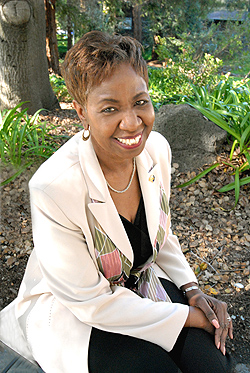Berkeleyan
Beth Luke makes a graceful exit
For almost two decades, HR program director has done the right thing for campus staff
![]()
| 18 April 2007
In her nearly two decades at Berkeley, Human Resources' Beth Luke has had both an official and an unofficial mission. Her formal charge has been to ensure that the campus's many human-resources managers understand how to apply university policies - while her personal raison d'etre has been making sure that individuals affected by those guidelines aren't forgotten in the process.
 "The desire to make a difference" has guided Beth Luke. (Peg Skorpinski photo) |
This balancing of "the policies and procedures and the human being" has always guided her work in HR, says Luke, who retires in May after a 19-year campus career, which she launched as an employee-relations specialist and ends as director of central HR's Benefits, Employee Relations, Employee Development and Training, Employment Services, and Grievance Coordination units. "Even when you have to make very difficult decisions that appear to be negative for the individual, you always try to leave the human dignity of that person intact."
Workplaces aren't perfect; they're "made up of human beings," adds Luke - and while employment law and policies may seem clear-cut, "treatment issues are very subtle, and how you get at them is sometimes really difficult." A manager widely praised for her effectiveness and humanity, Luke credits listening skills she developed in grad school, studying guidance and counseling, with "helping me approach HR in a little different way."
A different kind of welcome
Being someone who, by her own account, gets easily bored and thus thrives on new challenges, Luke has brought to fruition at Berkeley a number of initiatives that have touched all campus employees regardless of their pay grade. She collaborated with Student Affairs to expand the campus's Take Your Child to Work program by pairing students from Willard Junior High School with staff who had no children themselves. Earlier, while working with Staff Equity and Diversity Director Edith Ng on workplace-climate issues, Luke suggested that new staff be asked to complete not only an exit survey but an entrance survey, so that HR could get a better handle on staff-retention issues by learning what new staff hires expect and hope for when they accept a campus job. The entrance survey, since implemented, has proved "very telling," she says.
Luke and her team also introduced, in 2001, the annual Service Awards Luncheon, honoring staff who have settled in at Berkeley for the long haul. "Sometimes we forget to say 'thank you,' two words that are very, very powerful," she observes. At the appreciation event, staff are treated to "a beautifully decorated setting, a meal, and entertainment, with administrators there to greet them, she says. "For many of our staff, that's their only opportunity to meet the chancellor or a vice chancellor." The luncheon, as she puts it, "is not about policies or contracts; it's about acknowledging the individual."
An extended network of HR managers
Luke credits a team of "smart people that were forward-thinking and wanted to do the right thing" for the successful rollout, on her watch, of these and other innovative HR programs. "I didn't see my role as being any greater than anyone else's," she says. Rather, "our work got accomplished because of the team."
What she means by "team" extends beyond central HR to the campus's wider network of human-resources managers. When she assumed leadership of HR's Employee Relations unit in 1992, Luke also inherited Human Resources Managers, a network of about 25 HR staff focused on "traditional" human-resources responsibilities. Recognizing that there were others in units across campus who handle HR duties (in addition to other tasks), she invited those employees to join the network. Over time, it's grown to some 150 staffers. Monthly meetings cover a range of topics - from benefits changes to performance management, workforce trends, labor relations, and employee relations.
For Lisa Bolivar, HR director in the Office of the Vice Chancellor for Research, the meetings "give us a place to network, challenge policy, and discuss practice and implementation across campus," she says. "Beth brought us all together and disseminated timely, concise, and pertinent information in an open forum. Her graceful style showed us what a true HR professional is supposed to look like."
'Workaround' budgeting
According to campus admirers, Luke's innovative approach to budgeting has been another source of her effectiveness. Rather than shelve good ideas for want of resources, she's often taken a "workaround" approach - coming up with enough resources to test-drive the idea, on the optimistic assumption, often borne out later, that "once the program was out there and the institution saw the value of it," regular funding would eventually follow.
A more conventional procedure is to build a new program into the budget, and then wait to see whether it gets the green light. "That's one way" to approach the problem, Luke says. But in the lean environment in which she's had to operate for much of her career, "I wasn't optimistic about getting additional funding, and I didn't want that to stand in the way of being creative."
Challenges of a decidedly different nature await Luke as she moves to the next phase - retiring in order to spend more time with her four grandchildren, ages 2 to 14. After 33 years, total, in the HR field, she declares, "it's time to say 'It's been a wonderful career.' My job has been challenging, and some of the issues I've had to deal with have been gut-wrenching. But oftentimes, even on my most hectic day at work, when I'm walking across campus I might stop and look at its beauty. It's an amazing place, and I feel privileged to have been a part of it."

